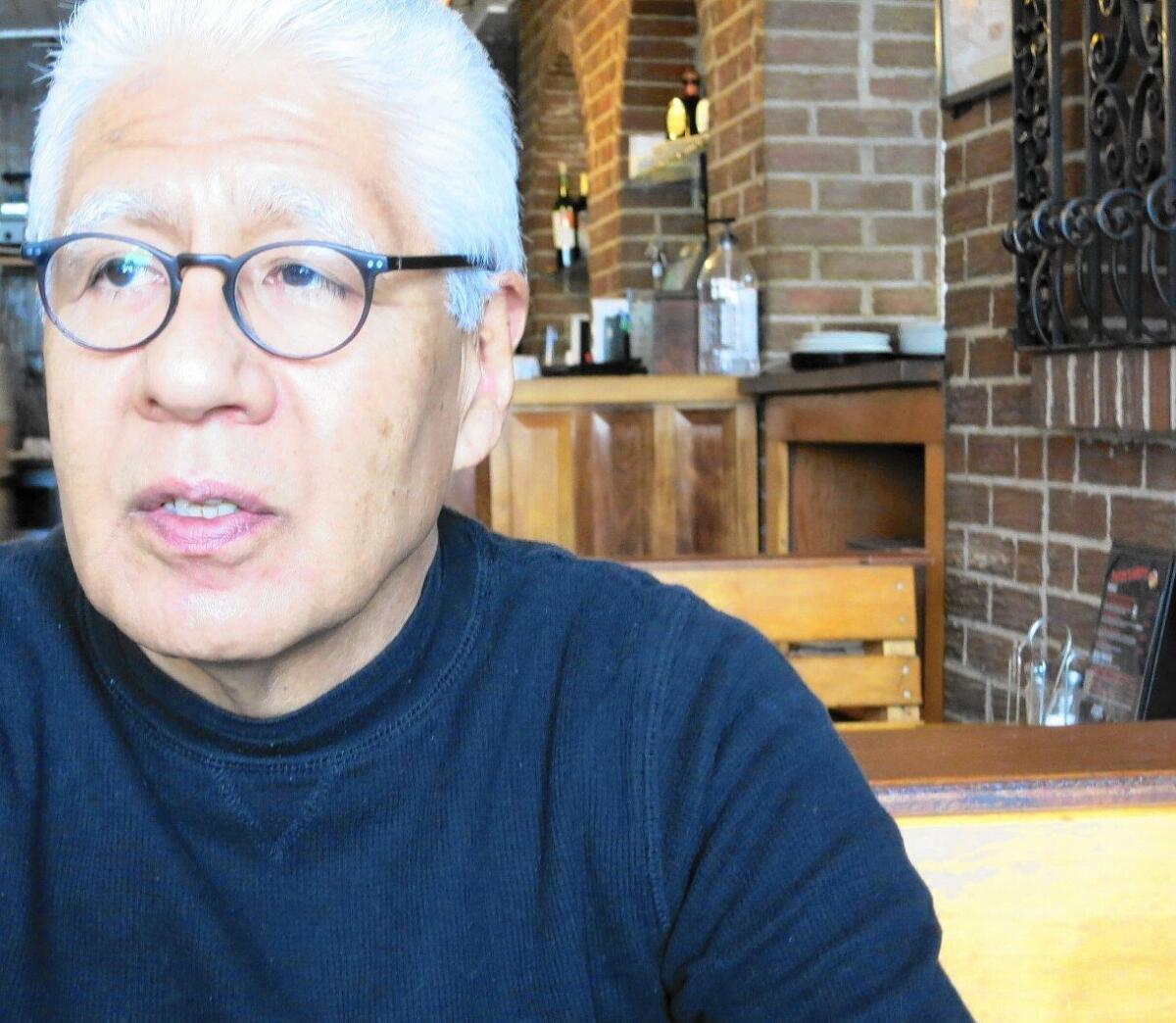Novelist Manuel Ramos makes sure Latinos are part of the story of Denver

- Share via
Reporting from DENVER — Whatever the changes sweeping his north Denver neighborhood, Manuel Ramos can at least count on the huevos con chorizo at Taqueria Patzcuaro. Wearing a black leather jacket that makes his swept-back hair seem stark white, he grabs a table and orders a plate of the familiar.
Men in sombreros and a mustachioed Emiliano Zapata stare out from black-and-white posters on the walls, a reminder that much of Colorado was, after all, Mexican territory well into the 19th century.
Ramos can trace his own roots to Mexico’s Zacatecas state, where his father was born before the family moved to the U.S. in search of work and wound up in the mining country of Colorado.
Ramos, born in 1948 in the southern Colorado town of Florence, thought of himself as a revolutionary. One of his first protests was a sit-in at his Colorado Springs high school. He still has the yearbook with the photo.
“I don’t quite remember the issue,” Ramos says. “I think they were trying to discipline a student over long hair or something stupid. So we sat in the hall. And there I was.”
He studied political science at Colorado State University and enmeshed himself in campus campaigns against the Vietnam War and in favor of more places for minority staff and students on campus. He went to law school at the University of Colorado because he saw law as a way to continue his activism.
For a time, when he decided he was fed up with the law and needed a break, he found a job in a motorcycle parts factory and tried, unsuccessfully, to unionize his fellow workers.
He wrote a short story about the factory. Then some more stories, which he published. Novels and literary prizes followed.
The neighborhood is a recurring character.
Next door to Taqueria Patzcuaro, a Realtor’s “available” signs are propped in the windows of Denver Music as the owners packed up their remaining inventory of Spanish-language movies and CDs. A few doors down is a frozen yogurt parlor and across the street a gourmet burger restaurant.
Gentrification can make it difficult to get his bearings. He and his wife sometimes find themselves driving down streets trying to remember what used to be at this corner or behind that storefront.
“It’s hard to reconcile the changes,” Ramos says between bites of his eggs. “You wonder where the people are going.”
In his 2013 novel “Desperado,” Ramos imagines the future of a north Denver taqueria. The main character, Gus Corral, discovers it has been redecorated like the bars and restaurants in the trendy parts of town, its walls covered with stock photographs celebrating the romantic Old West:
“No photographs of Mexicans,” Corral muses. “Guess we weren’t around when the photographer set up his equipment. We were probably picking crops for shipping on the next train, or lugging silver from … mines.”
Ramos puts Latinos back in the picture. He is known as a crime writer, but that doesn’t quite capture what he does. His books are love stories, political dramas, mordant cautionary tales. Characters who are Latino, black and white, artists, professionals and laborers, are described in staccato chapters, like a catchy corrido.
“It’s hard to find anything about Latinos in fiction about Denver,” Ramos says. “I’m doing something that’s not done.”
This year the Denver Public Library opened a branch named for activist and poet Rodolfo “Corky” Gonzales despite objections from some who view him as a violent radical. Outside the state, Gonzalez is perhaps best known for his poem “I Am Joaquin,” in which he summed up the complicated history of the complex people called Latinos or Chicanos or Hispanics, and declared, “I am still here!”
Despite official commemorations, Ramos worries that today’s activists fighting poverty, police brutality, and political and educational ills don’t always see that they are part of a long tradition, or that they may miss how much progress has been made.
“I have to be careful and not sound as though things haven’t changed, that things have not gotten better, that we’re all poor and oppressed,” Ramos says. “The impact that the Chicano movement had on this city is tremendous. But it’s hard to find the history.”
Ramos, who recently retired from a top job at the state legal aid program, says he wants to write a novel set during the Great Depression when the Colorado governor declared martial law and sent the National Guard to the New Mexico border to keep out poor non-Coloradans — for the most part Latinos, whom many whites viewed as competition for scarce jobs.
He says one of the characters would resemble his father, a man who knew the meaning of hard work and tried to teach it to his young son, who spent the summers with him on construction sites.
“He worked the hell out of me,” Ramos says with pride.
After lunch, he walks home along 32nd Avenue, where Corral in the book runs a secondhand shop. In one scene, Corral is on his way to work when he gets caught in a sudden storm that mirrors his inner turmoil.
Corral finds shelter.
“That’s Gus,” Ramos says. “He’s going to survive. But I don’t know that he’s going to stay in this neighborhood.”
More to Read
Sign up for Essential California
The most important California stories and recommendations in your inbox every morning.
You may occasionally receive promotional content from the Los Angeles Times.










